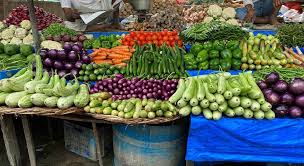Bengalureans reel from surging veggie prices
Beans, a staple in many households, have seen a significant price increase from Rs 177 per kilogram a week ago to Rs 227. Tomatoes and cabbage have also experienced sharp price hikes
Salar News
-
Representative photo
BENGALURU, 24 MAY
The prices of essential vegetables
in Bengaluru have surged due to heavy rainfall impacting yields and supply
chains.
Beans, a staple in many households,
have seen a significant price increase from Rs 177 per kilogram a week ago to
Rs 227. Tomatoes and cabbage have also experienced sharp price hikes.
Around 75 residents of Bharati Nagar,
led by Bharati Nagar Residents Forum President NS Ravi, protested at
Doddigunta, Cox Town, on Monday against the soaring vegetable prices. The
protesters demanded government intervention to stabilise the prices. The
peaceful protest concluded with a memorandum being submitted to Agriculture
Department officials.
The skyrocketing prices have
disrupted household budgets across the City. “I'm tired of adjusting my
household budget to accommodate these exorbitant prices. How can a middle-class
family like mine afford this?" said Smita Rao, a home cook from Jayanagar
4th Block.
"I have never seen such a
drastic increase in vegetable prices in my life. The cost of basic necessities
like onions and potatoes has doubled in just a few months. It's becoming
difficult to provide healthy meals for my family without breaking the bank,"
said Kavitha Kumar, a homemaker from Vajarahalli.
Consumers are forced to limit their
vegetable purchases or switch to lower-quality options. "We have to limit
our choices and quantity, even for basics like tomatoes and cabbage," said
Shalini Sebastian, a homemaker from Maruthi Sevanagar..
Umesh Mirji, the Managing Director
of HOPCOMS (Horticultural Producers' Cooperative Marketing Society) and the
Horticulture Department of Bengaluru, said the quantity of vegetables arriving
in the City has reduced. "The heavy rain has damaged crops, leading to a
shortage of vegetables."
The situation is worsened by the
difficulty in storing vegetables during the damp weather. While rain is crucial
for crop growth, excessive rainfall can cause waterlogging and soil erosion,
reducing crop yields. “Even the persistent dry spell in our State played an
important role in damaging the crops,” Mirji added. -Salar News
Leave a Reply
Your email address will not be published. Required fields are marked *










.jpg)
.jpg)
.jpg)
.jpg)
.jpg)

.jpg)
.jpg)

.jpg)
